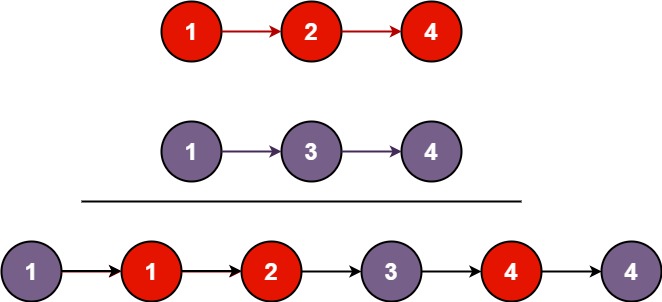Description
You are given the heads of two sorted linked lists list1 and list2.
Merge the two lists into one sorted list. The list should be made by splicing together the nodes of the first two lists.
Return the head of the merged linked list.
Example 1:

Input: list1 = [1,2,4], list2 = [1,3,4] Output: [1,1,2,3,4,4]
Example 2:
Input: list1 = [], list2 = [] Output: []
Example 3:
Input: list1 = [], list2 = [0] Output: [0]
Constraints:
- The number of nodes in both lists is in the range
[0, 50]. -100 <= Node.val <= 100- Both
list1andlist2are sorted in non-decreasing order.
Solution
Python3
# Definition for singly-linked list.
# class ListNode:
# def __init__(self, val=0, next=None):
# self.val = val
# self.next = next
class Solution:
def mergeTwoLists(self, list1: Optional[ListNode], list2: Optional[ListNode]) -> Optional[ListNode]:
res = curr = ListNode(-1)
while list1 and list2:
if list1.val < list2.val:
curr.next = ListNode(list1.val)
list1 = list1.next
else:
curr.next = ListNode(list2.val)
list2 = list2.next
curr = curr.next
rem = list1 or list2
curr.next = rem
return res.nextC++
/**
* Definition for singly-linked list.
* struct ListNode {
* int val;
* ListNode *next;
* ListNode() : val(0), next(nullptr) {}
* ListNode(int x) : val(x), next(nullptr) {}
* ListNode(int x, ListNode *next) : val(x), next(next) {}
* };
*/
class Solution {
public:
ListNode* mergeTwoLists(ListNode* l1, ListNode* l2) {
ListNode *curr = new ListNode;
curr->val = -1;
curr->next = NULL;
ListNode *res = curr;
while (l1 != nullptr && l2 != nullptr){
if (l1->val < l2->val){
curr->next = l1;
l1 = l1->next;
}else{
curr->next = l2;
l2 = l2->next;
}
curr = curr->next;
}
ListNode *leftover = (l1 == nullptr) ? l2 : l1;
curr->next = leftover;
return res->next;
}
};